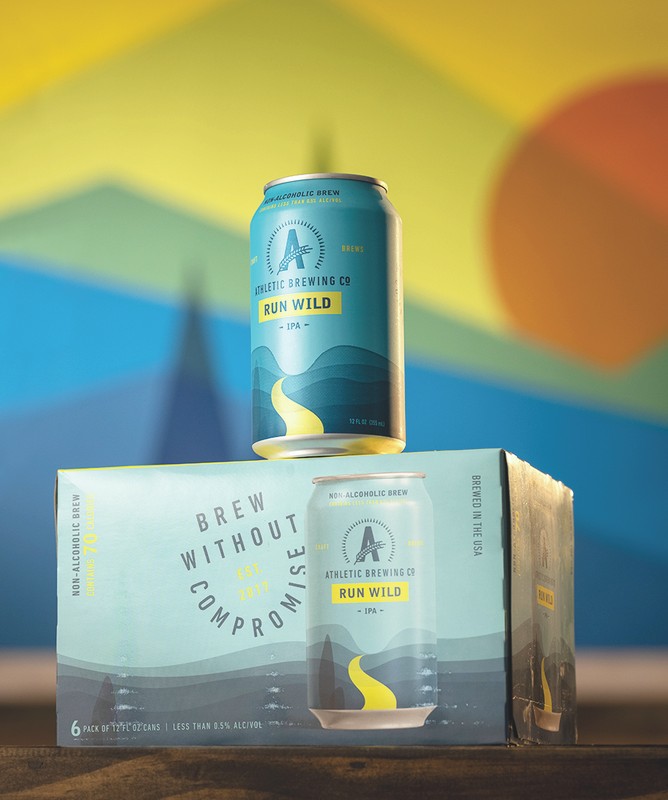
Athletic Brewing Co. has distinguished itself as the “first true omni-channel business in beer,” says co-founder and CEO Bill Shufelt. Thanks to its ability to tap into e-commerce, as well as utilize traditional and non-traditional channels, the Stratford, Connecticut-based producer of non-alcoholic craft brews is setting its own course for success. “For too long, beer has been defined in small boxes,” explains Shufelt. “We’re expanding where beer can exist in society.”
Launched just four years ago by Shufelt, a former financial analyst, along with head brewer John Walker, Athletic is a key contributor to the category’s recent
resurgence. According to Shufelt, volume for the company—which operates breweries in Stratford, Connecticut and San Diego, with plans for a third facility, also in Connecticut, to open by mid-year—nearly tripled to 100,000 31-gallon barrels in 2021. Athletic’s products are distributed in 40 states—although available online nationwide—and are expected to be distributed nationally by early next year.
Non-alcoholic beers (NABs), while still a tiny segment, are outpacing the overall beer market. According to Impact Databank, off-premise sales of de-alcoholized beer jumped 24% last year to $237 million. Craft NABs—of which Athletic holds a
47% share—are behind much of the growth, surging some 300% in 2021, says Shufelt. “Generational and health and wellness trends are driving the category’s rebound,” he notes, adding that e-commerce and “the information now available at people’s fingertips” is also playing a role.
Athletic Brewing produced some 48 different beers in 2021, all packaged in 6-packs of 12-ounce cans ($11), across a range of styles. At press time, a pilot run of draft beer was expected to begin this month. Run Wild IPA, which has received several accolades, has emerged as the company’s top seller. Shufelt is particularly excited about Athletic Lite, which launched this spring. With just 26 calories a serving, compared to 65 calories for Run Wild, he says the new brand has “every bit of the flavor of a typical light beer but with a quarter of the calories.”
In keeping with its creative approach to sales, Athletic also abstains from traditional beer marketing practices. Marketing efforts lean toward grassroots programs, such as distributing sample beers to race participants. Last year, the company hosted a pop-up bar in Austin, Texas that was “half gym, half bar,” and featured workout sessions and beers. “We’re going to do things like that more often,” Shufelt notes. But it’s the company’s “Two for the Trails” program, which donates 2% of the sale of every beer to restoring trails and park cleanups around the country, of which Shufelt is most proud. Noting that Athletic donated more than $1 million to restoration efforts across 35 states last year, he says the program “is part of our core values.”
The non-alcoholic status of Athletic’s products provides the company with the opportunity to market the brands in an array of accounts, and Shufelt and his team are taking full advantage. Beyond traditional accounts, he sees potential in venues like gyms, delis, pizza parlors, coffee houses, movie theaters, national parks, and even offices. And expanded on-premise placement offers even more opportunity, the marketer says, pointing to the potential to attract customers to bars and restaurants for “drinking occasions on weeknights.” Indeed, the company is making quick progress on-premise post Covid-19, with sales currently accounting for 10% of the company’s business. “Our on-premise business is explod- ing,” Shufelt says. “Buffalo Wild Wings is making a big bet.” The chain is planning to carry Athletic products at all locations by the middle of the year, he adds.
With NABs accounting for only about 1% of the beer market, Shufelt sees nothing but blue sky for the category. “It’s still so small relative to its potential and occasions,” he says. “I wouldn’t be surprised to see it grow to 10%-20% of the beer category over the next ten years.” And that’s likely to be incremental volume, he maintains, as NABs will help the industry add occasions. “Beer hasn’t had an occasion driver like this in years,” Shufelt notes. “Today’s non-alcoholic brews provide the potential for the beer category to grow.”